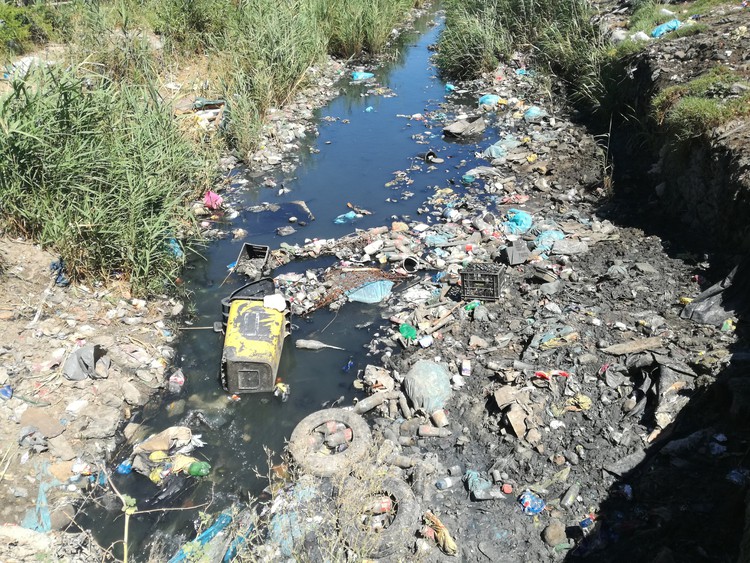Informal settlements need better rubbish collection
Reform of the system is necessary to “keep Cape Town clean”
City of Cape Town Mayor Dan Plato brought the “Keep Cape Town Clean” Campaign to Khayelitsha last week in a bid to teach residents how to take responsibility for keeping their community clean. But, as a study last year by the University of Cape Town shows, the rubbish collection system doesn’t work for people in informal settlements.
Residents of Site C, Khayelitsha, interviewed in the study argued that dumping rubbish was their solution to dealing with the shortfalls of the refuse removal service provided to their area. The response of the City of Cape Town’s Solid Waste Department highlighted some deeper issues with the appropriateness of refuse removal in Khayelitsha.
Since garbage trucks can often not enter informal settlements, the wheelie bin system is not available to residents. Instead, residents are expected to put their rubbish in plastic bags which are collected once a week by cleaners from a company contracted by the City, who drop off two new plastic bags. The cleaners take the rubbish to shipping containers nearby, which are emptied once a week.
But Site C residents said they are not given the two plastic rubbish bags to which they are entitled each week. Kagisho Mihi, the Head of Contract Management for the City of Cape Town’s Solid Waste Department, looked into this and asked contracted cleaners to photograph themselves delivering the plastic bags to the informal dwellings of Site C. The photographs revealed that in almost all cases, cleaners had to leave the bags outside locked homes rather than hand them directly to residents. As a result, some bags may be stolen when residents are not at home to receive them.
Some residents reported that they did not leave their rubbish bags outside their houses for collection because this attracted rodents and dogs which tore the bags up.
The system is based on the assumption that residents are at home during the day, when in fact many are at school, at work, or looking for work.
If the door-to-door collection service is to continue, residents should be provided with wheelie bins or structures outside their homes which protect their rubbish from rodents or dogs. Local communities should be consulted about an alternative way of distributing plastic bags, such as from the containers, community halls or shopping malls. Ideally, larger households would be allowed to collect more than two plastic bags.
Residents also voiced their frustration that cleaners are not hired locally. In response, Mihi said contractors randomly selected cleaners from names on the City’s Job Seeker database and made sure the cleaners worked in the same area in which they lived. But since contractors use legally recognised sections of Khayelitsha to define cleaning areas, rather than the smaller, communally-defined areas, such as Island or Taiwan, residents might see some of the cleaners as “outsiders” from a different neighbourhood. In order for cleaners to be accepted, the way in which they are chosen may need to be changed.
In June 2018, Councillor Xanthea Limberg said in email correspondence that refuse removal services in Site C have always met the required cleanliness standards. Yet rivers and wetlands around the informal settlements of Site C are full of litter.
Mihi explained that contractors are not responsible for cleaning rivers, wetlands or trenches. This is in line with the contractor’s tender agreement which states that contractors are required to remove litter from canals and rivers only if the litter “can be reached with a rake without going into the water and without the use of any special equipment, e.g. dredging machine”. The Transport and Urban Development Authority or the City’s Road and Stormwater Department are responsible for keeping the rivers clean.
A better way to keep rivers and wetlands clean would be to modify tender agreements so that contracted cleaners can be inoculated or provided with tools and protective gear so that they can remove litter, instead of depending on outside parties. Alternatively, a more centralised service should be created so that the efforts of the City of Cape Town’s Solid Waste Department can be better coordinated with those of these other departments.
Until the Solid Waste Department considers some practical reform of its refuse removal model, the informal areas of Site C could remain severely littered despite the efforts of Mayor Plato and the “Keep Cape Town Clean” campaign.
Green is a researcher with the Centre for Social Science Research at UCT. Views expressed are not necessarily those of GroundUp.
Support independent journalism
Donate using Payfast

Don't miss out on the latest news
We respect your privacy, and promise we won't spam you.
© 2019 GroundUp.
This article is licensed under a Creative Commons Attribution-NoDerivatives 4.0 International License.
You may republish this article, so long as you credit the authors and GroundUp, and do not change the text. Please include a link back to the original article.

